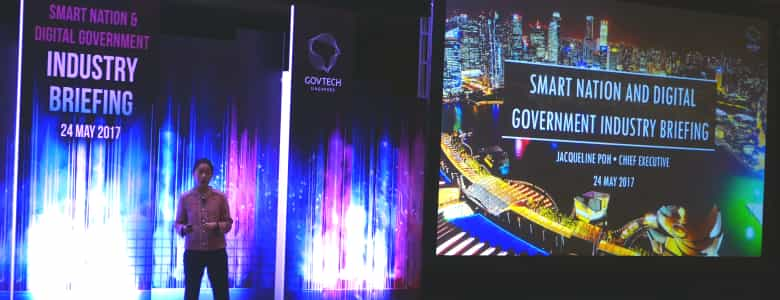Closer collaboration for the Smart Nation

The public sector and the private sector have to work together to build Singapore into a Smart Nation.
But ICT industry vendors and government agencies have traditionally kept each other at arms-length, maintaining perfunctory interactions purely focused on completing the project agreed upon in the job contract.
If Singapore is to become a Smart Nation — a country in which everything from homes and healthcare to urban mobility and day-to-day operations is transformed by technology — then this relationship needs to be transformed as well.
“We’re trying to build a very different relationship with industry,” said Government Technology Agency of Singapore (GovTech) Chief Executive Ms Jacqueline Poh. “We don’t want to be in a situation where industry is passive and is just waiting for the next tender. Instead, we want industry to really be looking at the problem, and helping us find a solution.”
Ms Poh was speaking to some 1,000 industry representatives who attended GovTech’s 2017 Smart Nation & Digital Government Industry Briefing, held on 24 May at the Marina Bay Sands Expo and Convention Centre.
There will be no lack of opportunities for collaboration: to hasten Singapore’s digital transformation, the government will be calling an estimated S$2.4 billion worth of information and communications technology (ICT)-related tenders in the 2017 financial year, Ms Poh announced.
More than two-thirds of these will be available for small and medium enterprises (SMEs) to bid for.
Fostering collaborations
“Building a Smart Nation isn’t just about technology. It’s also about people, businesses and users in the wider economy,” said Ms Poh.
To encourage interactions between the public and private sectors, GovTech has launched initiatives such as the InnoLeap programme, noted Ms Poh. InnoLeap provides a platform for government agencies to share problem statements and discuss possible solutions with the private sector, academic research institutes, and institutions of higher learning.
The programme has successfully connected public agencies with startups and SMEs, leading to several pilot projects.
Ms Poh also noted that GovTech has received feedback from industry that there is now a lack of information about government ICT standards.
The government is taking this seriously: for better transparency and accountability, GovTech plans to publish standards for digital services — in the areas of data sharing, cybersecurity, cloud hosting and the Internet of Things, for example — on its website, and will also carry out more industry consultations on the matter.
Building a nation’s senses
The government is keen to engage the private sector on a critical component of the Smart Nation initiative: the development of a nation-wide sensor platform.
“The best analogy is to a human — we cannot function without eyes, ears and a sense of smell or taste,” GovTech’s Deputy Chief Executive and Government Chief Information Officer Mr Chan Cheow Hoe said at the briefing.
“It’s the same for a country. We need to build a nation-wide platform that allows us to stream and sense data on a continuous basis. This will help us make better decisions.”
The ideal sensor network should be scalable, adaptable, integrated and secure; in addition, public agencies also need to be able to manage and make sense of the huge amounts of data collected by this network, said Mr Chan.
To achieve this, an open ecosystem is needed, with participation from various sectors of the ICT industry, he added.
To protect all this from hackers and cybercriminals, the government intends to establish security operation centres (SOCs), said Mr Ian Loe, GovTech’s Director for Cyber Security Monitoring and Response.
An SOC is not a physical entity, but a concept that ties together various cybersecurity capabilities, including analytics, automation and interoperability, elaborated Mr Loe.
“We’re headed for exciting times, but we don’t have all the answers,” said Mr Chan.
“It’s important that just as the government is stepping up to build ICT capabilities, industry also needs to do the same, or the Smart Nation project will not be successful. We should be building these capabilities for Singapore together.”
A thorough transformation
Now that virtually every public agency has plans to roll out digital services, companies will have no shortage of problems to work on.
Some of these initiatives were shared at the Industry Briefing.
The Ministry of Education (MOE), for example, plans to develop digital solutions to facilitate interactions between parents, students and teachers, said Chief Information Officer (CIO) Mr Tan Bee Teck.
An example of this is the Parents Gateway app, a one-stop ‘digital shopfront’ for parents to handle administrative matters and stay up-to-date about their children’s school activities.
There are also opportunities to partner with the Ministry of Health (MOH) in areas such as predictive models for hospital admissions, real-time disease surveillance, tools for home diagnosis, and telehealth, said Mr Chua Chee Yong, Head of IT Strategy and Planning.
Meanwhile, the Maritime Port Authority (MPA) is keen to collaborate in areas such as maritime cybersecurity, automated ship cleaning systems and autonomous ships that can run with a reduced crew strength, said CIO Mr Goh Kwong Heng.
Ms Jacqueline Poh welcomed industry partners to share ideas and suggestions on building the Smart Nation.
“We want to see how the tech industry can walk with us on this journey, and to see if you have solutions we haven’t thought of. We’re asking for imagination, flexibility and creativity.”
https://www.tech.gov.sg/media/technews/closer-collaboration-for-the-smart-nation
